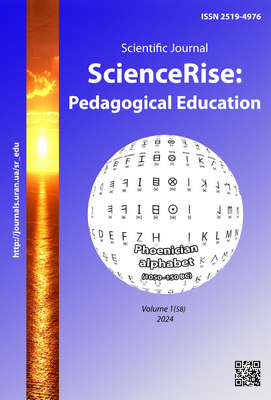Reinforcing Education through social-emotional learning: key research trends in Ukraine and worldwide
DOI:
https://doi.org/10.15587/2519-4984.2024.299183Keywords:
social-emotional learning, SEL Laboratory, current research trends, Ukraine and the worldAbstract
The paper explores the significance of advancements in social-emotional learning (SEL), underscoring SEL’s pivotal role in modern education through enhancing personal development, resilience, and socio-emotional competence. In Ukraine, the growing interest in SEL, spurred by societal challenges and individual needs, is evident.
The authors provide an overview of current SEL research, tracing its origins, exploring its theoretical foundations, and highlighting its key role in modern education. They call for interdisciplinary research collaboration to enrich SEL understanding and develop effective programs that foster socio-emotional skills among children and adults, addressing needs at both national and community levels within the educational sphere.
The paper also highlights the work of the SEL Laboratory at the EdCamp Ukraine NGO, which stands out as a hub for scientific exploration, fruitful collaboration, and the use of effective SEL methodologies. It details several key areas of SEL research that the laboratory is focusing on, including customizing SEL frameworks to fit the Ukrainian educational context, refining existing SEL evaluation tools, investigating SEL's cultural nuances within Ukraine, challenges, encountered in implementing SEL programs and the impact of SEL on teaching methodologies. Furthermore, the laboratory engages in international collaboration, contributing to global projects and creating programs, aimed at advancing SEL practices.
The paper contributes to the ongoing dialogue on SEL and stimulates further research in the area. The findings will aid researchers studying social-emotional learning, educators aiming to implement SEL programs in their practice, and policymakers, committed to enhancing modern education. It concludes with a roadmap for the laboratory's future research, the outcomes of which will be reflected in future publications
References
- Elkin, O. (Ed.) (2023) SEEN-putivnyk. Sotsialno-emotsiine ta etychne navchannia: osvitnia prohrama dlia navchannia sertsia y rozumu. Kyiv: TOV «Inzhynirynh», 148.
- EdCamp Ukraine. Available at: https://www.edcamp.ua/en/main-page/
- Pro provedennia eksperymentu vseukrainskoho rivnia za temoiu «Orhanizatsiino-pedahohichni umovy formuvannia v uchniv miakykh navychok shliakhom sotsialno-emotsiinoho ta etychnoho navchannia» na bazi zakladiv zahalnoi serednoi osvity Ukrainy na lystopad 2019 – hruden 2024 rokiv (2019). Nakaz Ministerstva osvity i nauky Ukrainy No. 1431. 18.11.2019. Available at: https://bit.ly/3nipppA
- DoSEN – mizhnarodne doslidzhennia sotsialno-emotsiinykh navychok. Available at: https://dosen.edcamp.ua/
- Armstrong, T. (1999). 7 (Seven) Kinds of Smart: Identifying and Developing Your Multiple Intelligences. New York: Plume, 320.
- Gardner, H. (1983). Frames of Mind: The Theory of Multiple Intelligences. New York: Basic Books, 528.
- Salovey, P., Mayer, J. D. (1990). Emotional Intelligence. Imagination, Cognition and Personality, 9 (3), 185–211. https://doi.org/10.2190/dugg-p24e-52wk-6cdg
- Goleman, D.(2007). Social Intelligence: The New Science of Human Relationships. New York: Bantam, 416.
- Goleman, D. (2011) The Brain and Emotional Intelligence: New Insights. New York: More Than Sound LLC, 79.
- Bar-On, R. (1997) The emotional quotient inventory (EQ-i): A test of emotional intelligence. Toronto: Multi-Health Systems.
- Fundamentals of SEL. Available at: https://casel.org/fundamentals-of-sel/
- The Ecological Approaches to Social Emotional Learning (EASEL) Laboratory. Available at: https://easel.gse.harvard.edu/
- The Gaming SEL Lab. Available at: https://www.unco.edu/cebs/educational-technology/gaming-sel/
- The SEL Lab. Available at: https://sel.ecps.educ.ubc.ca/about/
- Beyond Academic Learning: First Results from the Survey of Social and Emotional Skills (2021). Paris: OECD Publishing. https://doi.org/10.1787/92a11084-en
- Schools as hubs for social and emotional learning: Are schools and teachers ready? (2023). OECD Education Spotlights, No. 4. Paris: OECD Publishing. https://doi.org/10.1787/f6d12db7-en
- Navigating SEL From the Inside Out. Looking Inside & Across 18 Leading SEL Programs: A Practical Resource for Schools and OST Providers-Middle & High School Focus (2022). The EASEL.Lab. Available at: https://wallacefoundation.org/report/navigating-sel-inside-out-looking-inside-across-18-leading-sel-programs-practical-resource
- Jones, S. M., McGarrah, M. W., Kahn, J. (2019). Social and Emotional Learning: A Principled Science of Human Development in Context. Educational Psychologist, 54 (3), 129–143. https://doi.org/10.1080/00461520.2019.1625776
- Durlak, J. A., Domitrovich, C. E., Weissberg, R. P., Gullotta, T. P. (Eds.) (2017). Handbook of social and emotional learning: research and practice. New York: The Guilford Press, 197–212.
- Mahoney, J. L., Weissberg, R. P., Greenberg, M. T., Dusenbury, L., Jagers, R. J., Niemi, K. et al. (2021). Systemic social and emotional learning: Promoting educational success for all preschool to high school students. American Psychologist, 76 (7), 1128–1142. https://doi.org/10.1037/amp0000701
- Navigate the complex field of social and emotional learning. Available at: http://exploresel.gse.harvard.edu/
- Шляйхер, А. М’які навички 20-го століття стали твердими навичками 21-го. Available at: https://osvitoria.media/experience/andreas-shlyajher-m-yaki-navychky-20-stolittya-staly-tverdymy-navychkamy-21/
- Philanthropy for Social and Emotional Learning. Results from a global survey on interventions to develop and measure social and emotional skills (2023) OECD. Available at: https://www.oecd.org/dev/development-philanthropy/Philanthropy-for-social-emotional-learning_OECD.pdf
- Durlak, J. A. (2016). Programme implementation in social and emotional learning: basic issues and research findings. Cambridge Journal of Education, 46 (3), 333–345. https://doi.org/10.1080/0305764x.2016.1142504
- The CASEL Guide to Schoolwide Social and Emotional Learning. Available at: https://schoolguide.casel.org
- Navigating Social and Emotional Learning From the Inside (2021). Available at: https://wallacefoundation.org/sites/default/files/2023-08/navigating-social-and-emotional-learning-from-the-inside-out-2ed.pdf
Downloads
Published
How to Cite
Issue
Section
License
Copyright (c) 2024 Olha Rasskazova, Oleksandr Elkin, Viktoriia Hrynko, Oleg Marushchenko

This work is licensed under a Creative Commons Attribution 4.0 International License.
Our journal abides by the Creative Commons CC BY copyright rights and permissions for open access journals.
Authors, who are published in this journal, agree to the following conditions:
1. The authors reserve the right to authorship of the work and pass the first publication right of this work to the journal under the terms of a Creative Commons CC BY, which allows others to freely distribute the published research with the obligatory reference to the authors of the original work and the first publication of the work in this journal.
2. The authors have the right to conclude separate supplement agreements that relate to non-exclusive work distribution in the form in which it has been published by the journal (for example, to upload the work to the online storage of the journal or publish it as part of a monograph), provided that the reference to the first publication of the work in this journal is included.







